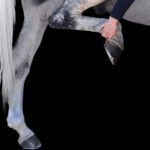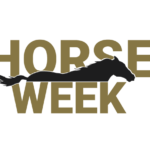
February 2, 2009 — Animal Planet is ratcheting up its hybrid “docu-soap” format with the compelling drama of JOCKEYS, a penetrating look at the riders who make Thoroughbred racing run. The series, which begins February 6 at 9 p.m. ET/PT, is guaranteed to hook viewers right out of the starting gate.
You’ll remember “Horsepower: The Road to the Maclay,” that groundbreaking 2006 Animal Planet show. Its episodes enabled us to be on the scene for the rivalry between trainers Frank Madden and Andre Dignelli while getting to know Brianne Goutal, Maggie McAlary, Maria Schaub and many of the other young riders seeking that ultimate hunter seat equitation prize, the ASPCA Maclay.
JOCKEYS employs a bigger stage and a tougher tag line (“Win or Die Trying”) as it follows a group of the wiry athletes during the Oak Tree meeting at Santa Anita racetrack in California. These men and women aren’t riding to have their names engraved on a silver bowl; they’re riding for big money and the chance to do something that’s in their blood. Too often, though, jockeys pay with their blood, and the docu-soap never shies away from telling it like it is–and showing it like it is. There’s no script, just 12 episodes of guts and glory.
“It was pretty much fly-on-the-wall,” executive producer Jason Carey said of the way the show was done.
Whatever your opinion of racing, you can’t help rooting for these real-life stars as they strive not only to make their dreams come true, but also to stay in one piece as they do it.
For many people, the show will be easier to follow than “Horsepower,” as the concept rises to the next level and viewers get to know the key players in a sport where all that counts is crossing the finish line first.
“Over the past year and a half, we’ve been pushing the envelope on the type of stories we want to tell, and JOCKEYS fits that concept,” Jason observed.
“We’re really digging into the realities of horse racing and the relationship between the jockeys and horses and the partnership they have to build to win races.
“As Animal Planet, we care about the safety of both the riders and horses. We know it’s controversial, but we’re not afraid of that. We feel the relationship between the horses and jockeys is what we’re digging into; we’re not telling an investigative piece on racing. Luckily, we did not have any horses hurt in the races that we shot.”
The staff from Go Go Luckey productions that put the series together started interviewing jockeys, and the group they finally came up with were the ones who rose to the top.
There are some great stories from “a diverse group of characters,” said Jason put it.
Animal Planet is interested in doing a Season 2, so if you get hooked, there may be more to come.
Asked about the origin of shows such as JOCKEYS, Animal Planet’s senior vice president of marketing, Vicki Lowell, explains, “We get ideas all over the place and typically, we as a team talk about which ones fit with the brand and where we’re taking it, as well as what’s going to be compelling television and great stories. Then we do research and get feedback on the concept,” she says, noting that focus groups often are used.
The aim is to make the shows “more buzz-worthy, more contemporary, going into areas where maybe in the past we didn’t go. An area that is controversial is also an area of great passion and engagement for the viewer,” she adds, citing Animal Planet’s “Whale Wars” as another example of this type of show.
One of the key characters in JOCKEYS is Mike Smith, featured along with his girlfriend, Chantal Sutherland, who occasionally competes against him in races.
Not everyone would want to have a camera follow him around for weeks as he faces the ups and downs of life, but Mike thought it would be a good idea.
“I really wanted to showcase our sport and show people what a wonderful sport it is and how much we care for horses and all that goes into preparing ourselves,” says Mike.
Raised in New Mexico, getting involved with everything from barrel racing to roping, he confesses, “I was a little cowboy. I did 4-H and rode steers. You name it, I pretty much did it, except show jumping.”
He also took part in some bull riding, but he thinks race riding is harder. He’s been doing it since he was 11 at area farms.
“When you have such a passion for something, your eyes are wide open and you learn. It came pretty natural to me,” he says. “The most important part of it is being able to communicate with a horse.”
He found the folks behind the cameras for JOCKEYS very accommodating, but he didn’t want to disrupt the flow of the show.
“If there was a moment I needed to cool off, they would give you that time, but that’s part of the show–you get very upset when you get beat; there’s a lot on the line,” says Mike. “There are times when you’d like more time to cool off, but you just go for it and show both sides.”
Imagine having a camera follow your every move, both at work and at home. Wouldn’t you be nervous?
Mike did say that “you start out being (cautious),” but adds, “you get used to the cameras and it starts to flow after that. It was a great opportunity to show our sport and how much we care for these horses.”
Jason felt there is no put-on or pretense in the series. This definitely doesn’t involve acting.
“These guys were pretty much themselves,” he says. “They’re great characters, and they have vivid lives.”
Watch a preview of JOCKEYS:
Chantal Sutherland, Not Your Average Jockey
The dream of being a jockey took hold of Canadian rider Chantal Sutherland when she was only 13 years old. Her father, Hugh Sutherland, was a racehorse owner, and she often met jockeys as a result. The minute she heard that there were female jockeys, she was, almost literally, off to the races.
In her youth, she competed in eventing and dressage, as well as field hockey and downhill racing, all combining for a blend of speed, toughness and horse knowledge that has served her well in her unusual career.
While attending York University in Toronto, where she double-majored in psychology and mass communication, Chantal galloped horses during the summers. In an occupational psychology class, Chantal’s profile matched her ambition: jockey. The only question was, could the 5-foot, 2-inch, 112-pound student be successful at it?
“I wanted to do something I was going to love; I didn’t want to work in an office. It’s tough to get started–most people tell you, ‘You can’t do it’,” says Chantal, who recalls one crusty Canadian trainer advising her that she would never make it as a jockey, contending she “just didn’t have it.” His derisive comments only fueled her determination to prove she did.
He had, however, also suggested that if she couldn’t be dissuaded, she should try to learn from someone as skilled as the legendary Angel Cordero. So Chantal called information, got Angel’s number and asked for his help. Off she went to Florida to work with him.
“Angel was great,” says Chantal, who picked up the pointers she needed to get a start. In her first shot at Canadian races, she rode 20 times and won four.
“I see that guy every day who told me I wouldn’t make it,” says Chantal, who has never discussed her success with him. “He looks at me a lot and I know he knows.”
Chantal picked up an impressive sideline when she was racing at Gulfstream in Florida one winter. Her face was used on billboards, then on a magazine cover and she wound up in Vogue magazine’s Shape issue, photographed by none other than Annie Lebovitz. She’s also been featured in People magazine. Chantal is also the spokeswoman for a Canadian company, Mistra Beauty. Just a note: she doesn’t wear mascara when she races, because her lashes touch the goggles “and it kind of gets in the way.”
When Chantal met Mike, she was still learning to be a rider. Her father told him on the sly that he should warn Chantal not to be a jockey, so he did.
Even though she thought he was cute, “I hated him,” she recalls. “I didn’t talk to him again for another year and a half or two years. Then he came to New York and asked me out to dinner, and that was it.”
A jockey/jockey romance is difficult. Understandably, Chantal worries; she knows the perils of racing firsthand.
“It’s easier to race with him than to watch him,” she says. There was, however, that one time when they were in the same race and he yelled at her as she headed for a spot that he thought was too tight for her to get through.
“Don’t go in there, Chantal,” he shouted.
“It distracted me,” she told him afterwards. “Don’t do that.”
Chantal, 32, has been race riding for nine years, and her resume includes two starts in the Breeders’ Cup. She isn’t planning to stay at the track forever, however, maybe just another three or four years.
“At some point, I would like to have a family if that’s possible,” she comments, but has no plans to resume riding after having children. “It’s too dangerous. I know how dangerous it is.”





